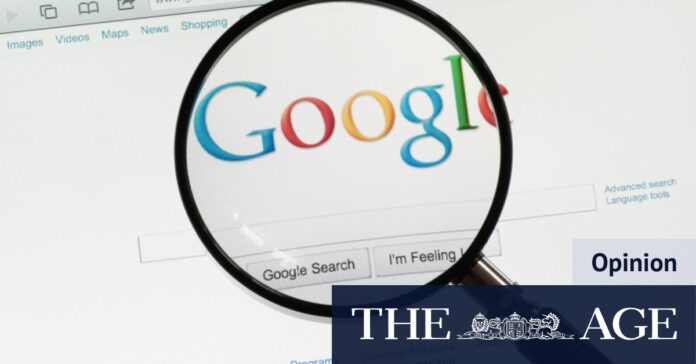[ad_1]
It remains to be seen whether Google introduces charges for its artificial intelligence (AI) products and, if it does, whether the other emerging giants of the technology follow its lead. Perhaps every question will cost a few cents. We might have to pay extra for longer, more detailed answers. Or there could be a monthly subscription option, covering everything you might possibly want to know.
One point should surely be absolutely clear. As consumers, we should be begging Google to make us pay. Sure, free stuff is great to start with. But it also means everything is driven by advertising until it becomes unusable. Paid-for AI will be far better, and much more useful in the long run – and it is customers that will come out ahead.

Google’s owner Alphabet is weighing up whether to put its AI-powered search features behind a paywall.Credit: iStock
It could turn out to be the biggest change of strategy in the company’s 25-year history. According to reports, Alphabet, as the owner of the Google search empire is now called, is weighing up whether to put its AI-powered search features behind a paywall, forcing consumers to pay to use them; or whether to keep them completely free, as its basic search function, email server, maps, and all the other services it provides are at the moment.
Other AI services are grappling with a similar dilemma. ChatGPT, currently the runaway market leader, has a free version and a slightly superior paid-for model, and most of the other major AI tools are opting for something similar.
This is a tough decision for Google. After all, giving stuff away for nothing has worked out brilliantly for the company. It has built a business worth a staggering $US1.8 trillion ($2.7 trillion). Its advertising revenues are $US175 billion a year, mostly from its search engine and other related products. It has been a winning formula, and it will be very difficult for it to change now.
Loading
Against that, however, AI poses two major challenges. We may all gradually stop searching for information and products on the internet, and simply ask a smart chatbot to do it for us. If that happens, Google’s search ads will steadily become less valuable. Even worse, AI uses so much server power and such sophisticated chips, that it is far more expensive to run than traditional web pages. Caught between those two forces, Google may easily find its profits start to get squeezed.
We all like getting something for nothing. The explosion of web services over the last 20 years means that we all get a whole range of incredibly sophisticated products effectively for nothing. We can search for anything we want, send emails around the world, find anything on maps, chat to friends and family on social media, and store our photos forever – and apart from a broadband connection, it doesn’t cost us anything at all. It is, in some ways, a great deal.
The catch was that it all had to be funded by advertising. Over time, search became more and more useless as the answers to any question were dominated by sponsored results. Mail systems were cluttered up by messages from companies, and maps were dominated by nudges towards one shop or another. Meanwhile, everything we said on social media was bundled up and sold as a commodity to be traded by marketers. As a former Google web designer memorably put it, “If you are not paying for the product then you are the product.”
[ad_2]
Source link


